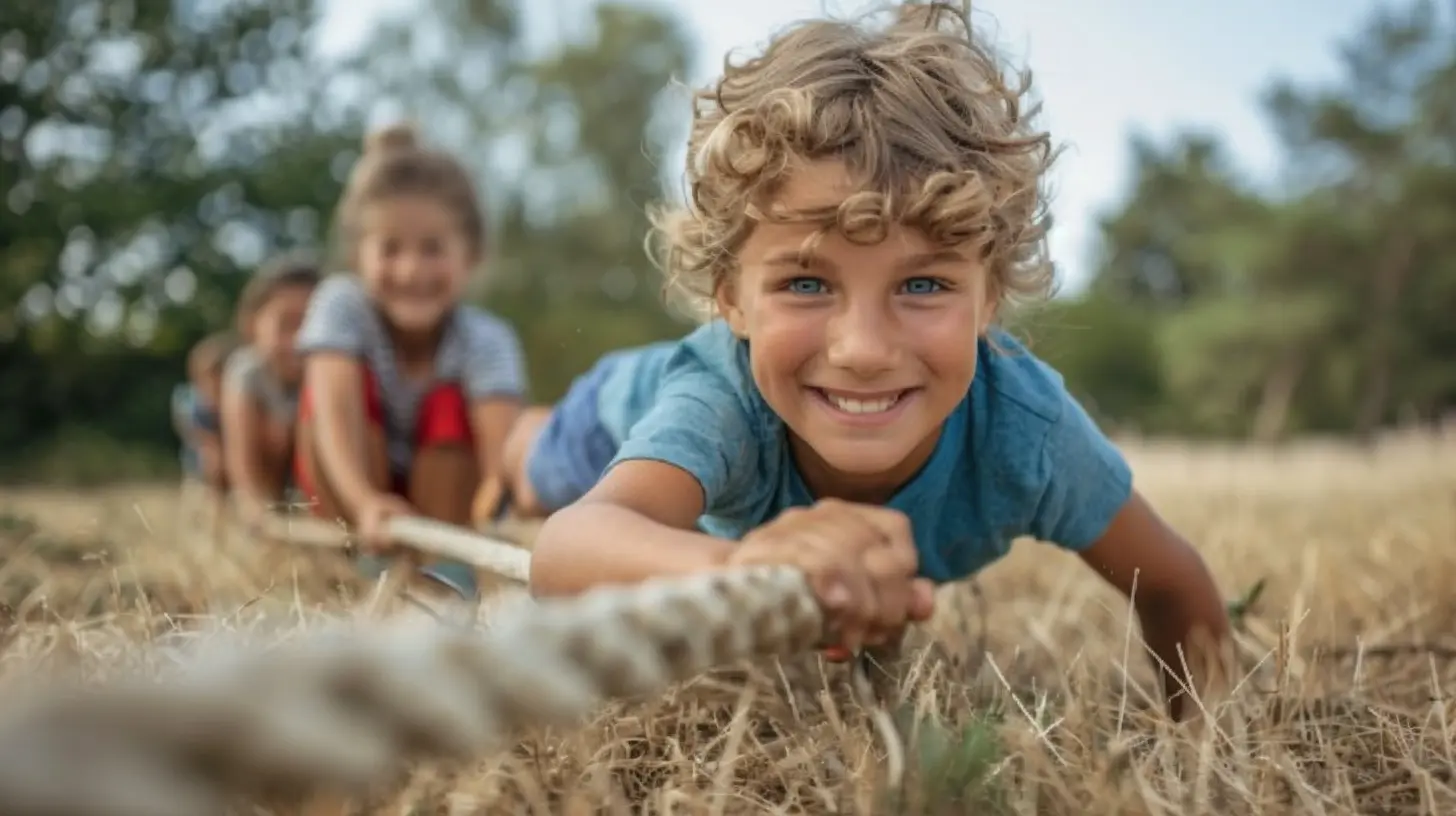Exploring the Benefits of Outdoor Games for Kids
3 September 2025
Alright, let’s be honest. In today’s world, kids are more glued to screens than ever. Tablets, smartphones, gaming consoles—you name it. And hey, it's not always bad. But what about the good ol’ days of jumping in puddles, racing friends on bikes, playing tag until the streetlights came on? Yeah, that stuff. Outdoor games.
They’re more than just a way to kill time. They're a surefire way to give kids a well-rounded childhood. So, sit back, grab a coffee (or maybe a juice box if you're feeling nostalgic), and let’s dive into why outdoor games are pure gold for our kids.
The Digital Dilemma: Why Screens Aren't Enough
Let’s face it—we live in a digital jungle. Kids know how to swipe before they can talk. But while technology trains certain skills like hand-eye coordination or problem-solving, it doesn’t offer the full package.You can't replace the fresh air, the sun on your skin, or the adrenaline rush of winning a race with pixels on a screen. Kids need more than just mental stimulation. They need to move, to feel the wind in their hair, and laugh out loud without a mute button.
Health Comes First: Physical Fitness Boost
Think of outdoor play as a gym membership—but fun and free. When kids are out climbing, running, jumping, and hopping, they’re not just playing—they’re working out. Without even realizing it, they’re building up:- Cardiovascular health: Running, sprinting, or biking gets their heart pumping.
- Muscle strength: Climbing trees or monkey bars? That’s some serious upper body work.
- Coordination and balance: Activities like jump rope or hopscotch sharpen those motor skills.
And the best part? They’re doing all of this with a smile on their face.
Mental Giants in the Making: Cognitive Benefits
Here’s the kicker. Outdoor games don’t just work the body—they fuel the brain too.When kids engage in unstructured play, they’re using creativity, problem-solving skills, and thinking on their feet. Ever seen kids create an imaginary world out of sticks and stones? That’s innovation at its rawest.
Plus, being outdoors supports better attention spans. Nature has a calming effect that helps reduce mental fatigue and even symptoms of ADHD.
So in short? Playing outside literally makes kids smarter.
Social Butterflies: Building Relationships and Communication
Let’s talk about the social side of things. Online, kids may be experts at emojis, but how about handling real-life conversations, conflicts, or teamwork?Outdoor games teach vital social skills:
- Teamwork: Games like capture the flag or soccer teach collaboration.
- Conflict resolution: Who goes first? Was that a fair tag? Kids learn to negotiate and compromise.
- Leadership and empathy: Taking turns, cheering for each other, or helping a friend who’s fallen—these small moments shape big character traits.
So yeah, outdoor play is social training in disguise.
Confidence, Resilience, and the Power of Failing
Every scraped knee, every lost race, every failed monkey bar attempt—it’s all worth it. Why? Because it builds grit.When kids face small challenges in outdoor games, they learn persistence. They gain confidence with every victory and resilience with every setback.
They figure out that falling isn’t failing. It’s just step one to winning. Don’t we all need that kind of mindset?
Nature’s Classroom: Environmental Awareness
Remember the joy of catching fireflies or collecting colorful leaves? Nature play connects kids to the environment.They start to notice things—weather patterns, animals, the change of seasons. Even if it’s just a local park, being outside fosters a natural curiosity and a sense of responsibility towards Earth.
Kids who play outside are more likely to care about the world around them. That’s how future eco-warriors are born.
Unplug and Reconnect: Family Bonding Opportunities
Let’s not overlook our own role in this. Outdoor games can be a great way for families to bond. Whether it’s a weekend game of tag in the backyard or a hiking trip in the woods, these moments are priceless.No Wi-Fi, no notifications—just real conversations and shared laughter. Quality time doesn’t need to cost a thing. Sometimes, it just needs a patch of grass and a ball.
Creativity Unleashed: Imaginative Play
The outdoor world is like an open-ended toy box. No two sticks are the same. A tree can be a castle, a fallen log can be a space ship, and shadows can turn into dragons.Outdoor games allow kids to make their own rules, create their own stories, and invent their own worlds. This kind of imaginative play boosts creativity, problem-solving, and storytelling skills.
Let’s be real—Minecraft is cool, but building forts out of cardboard and leaves? That’s a whole different level of awesome.
Sunlight and Sleep: The Hidden Health Perks
You know how you sleep like a baby after a day at the beach? Same goes for kids. Outdoor play isn’t just about tiring them out—though that definitely helps!- Sunlight exposure boosts Vitamin D, which supports bone growth and immune function.
- Natural light also helps regulate sleep-wake cycles, making it easier for kids to fall asleep at bedtime.
So more play = better sleep = happier kids (and let’s be honest, happier parents too).
Reducing Anxiety and Boosting Happiness
There’s something magical about nature that calms us down. It’s not just in our heads—it’s backed by science.Outdoor play reduces stress, lowers anxiety, and elevates mood. It’s nature’s version of therapy, and it’s available at your local park.
When kids run wild and free, they’re not just being kids—they’re also improving their mental health. And that’s a big win.
Types of Outdoor Games That Pack A Punch
Need a few ideas to get the kids moving? Don’t worry—we’ve got you covered. Check out these favorites:1. Classic Games
- Tag- Hide and seek
- Duck, duck, goose
- Hopscotch
2. Team Sports
- Soccer- Basketball
- Capture the flag
- Kickball
3. Adventure Play
- Obstacle courses- Nature scavenger hunts
- Fort building
- Water balloon fights
4. Individual Challenges
- Jump rope- Hula hooping
- Bike riding
- Roller skating
Each type has its own magic. Mix it up and keep it fresh!
How to Encourage Outdoor Play (Even If You’re Busy)
Let’s be real. Life gets hectic. But you don’t need to uproot your world to make space for outdoor games.Here are a few quick tips:
- Set daily “tech-free” hours in the backyard.
- Make weekend outings a habit (parks, nature trails, beaches).
- Organize small playdates outdoors.
- Create a mini playground with just a few basic items—balls, jump ropes, cones.
- Be a role model. If they see you biking or walking, they’ll want to join.
Small efforts lead to big changes.
The Long-Term Impact: Raising Stronger, Healthier Humans
Here’s the bottom line—outdoor games are essential, not optional. They create habits that last a lifetime.Kids who play outside grow up to be more active, more social, more resilient adults. They embrace challenges, handle stress better, and maintain healthier lifestyles.
What you’re really giving them through play is the toolkit for a better life. Pretty powerful, right?
Final Thoughts: Let the Kids Be Kids
At the end of the day, childhood is short. Let them run. Let them fall. Let them climb, splash, and scream with joy. Outdoor play isn’t just fun—it’s foundational.In a world filled with tech and to-dos, outdoor games offer kids a precious gift—the chance to just be kids.
They'll thank you for it, even if it's with muddy shoes and grass-stained jeans.
all images in this post were generated using AI tools
Category:
Games For KidsAuthor:

Emery Larsen
Discussion
rate this article
2 comments
Damian Clayton
Great insights! Let kids play!
January 21, 2026 at 3:43 AM
Caroline Coffey
Outdoor games are a gateway to adventure and growth for kids! They foster teamwork, boost creativity, and enhance physical health while creating lasting memories. Encouraging our children to play outside not only nurtures their well-being but also strengthens their spirit. Let them explore!
September 4, 2025 at 2:53 AM

Emery Larsen
Thank you for highlighting the vital role outdoor games play in children's development! I completely agree that they promote teamwork, creativity, and overall well-being. Let's keep encouraging outdoor exploration!


